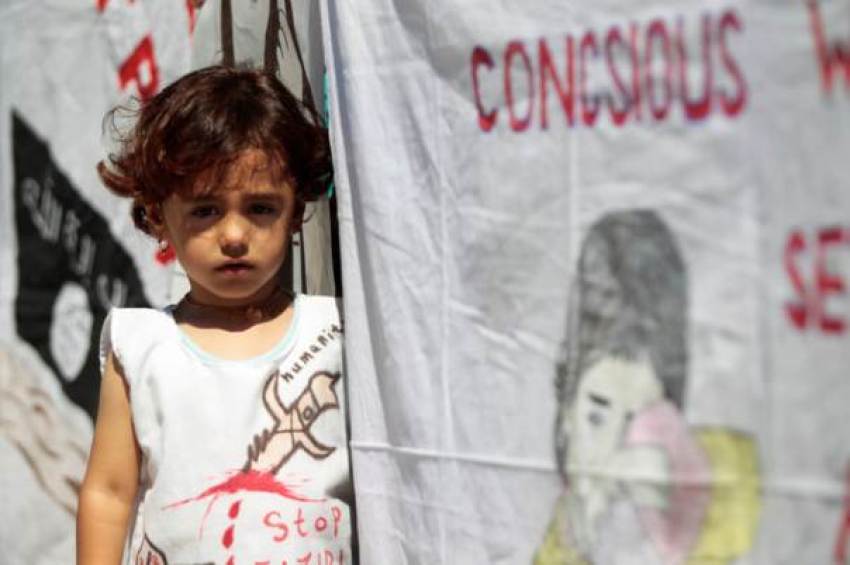Yazidi women raped by ISIS forced to abandon children or face rejection from community

Hundreds of Yazidi women raped by members of the Islamic State are being forced to choose between abandoning the young children born to them during captivity or facing expulsion from their own community.
Barfe Farho, a Yazidi who had been kidnapped by the Islamic State in Syria, gave up her 11-month-old daughter, Maria, after she was told the little girl, born of her jihadist captor, would never be accepted by her ethnic and religious community.
“I was told that she couldn’t be accepted because she would always be a ‘daughter of Daesh [Islamic State]’. They said: ‘we must forget our daughters killed by Daesh, so you can forget yours,’” she told The Telegraph.
The 26-year-old mother, who has two older children — sons Jegar, 5, and Jan, 4 — was faced with an impossible choice after being freed from captivity in March: “I could either give two of my children a good life or a bad one to all three,” she said.
Farho was among thousands of Yazidi women and girls captured from their homeland in Sinjar, northern Iraq, in 2014. While many of the captives died, most of the survivors were forced to convert to Islam and used as sex slaves by Isil fighters.
Since the fall of the “caliphate” in 2017, many of the women have been allowed to return to Yazidi communities. However, their children born to jihadists — believed to be in the hundreds or low thousands — are still considered Muslim and thus will not be welcome.
Farho was captured while five months pregnant, along with her husband and infant son. Eventually, her husband was taken away, and she was passed around several times until she ended up with a senior Chechen commander, Maria’s father.
When the Chechen discovered Farho was pregnant, he tried to get her back to her family in Iraq but was executed for treachery after his plan was discovered.
“Each minute of our time there I would pray we would all die right then together, so that we did not have to live another day,” Farho told The Telegraph. “I did not want my children growing up to see me as someone’s slave.”
Farho and her children were rescued in March 2019 and currently reside at her brother’s house in Shekhan, Iraqi Kurdistan, where Yazidis displaced from Sinjar have set up a temporary home.
She admitted that reacclimating has been hard — especially for the boys, who have no memory of life before their capture. Her older son, who remains traumatized by the atrocities he witnessed, refuses to leave her side, fearing he too could disappear.
Farho does not even have pictures of Maria, who was taken to an orphanage in northern Syria.
“The worst part is she won’t even know that she had a mother who loved her very much,” she said, adding: “I wish the third one was here. She is a part of me and what happened was not my fault, I never chose this."
In 2014, Yazidi elders declared that women and girls taken by the Islamic State could be religiously “purified” and welcomed back. In April of that same year, Yazidi Higher Spiritual Council, their highest religious authority, issued a statement that suggested they would be willing to accept the children too.
However, it was retracted the next day following pressure from conservative Yazidis, who argued that accepting children born in captivity would compromise the purity of the Yazidi bloodline.
“We did not mean the children born as a result of rape at all, but those who were born from Yazidi parents and were kidnapped during the invasion of Sinjar by [the Islamic State] on August 3, 2014,” the council stated, according to Foreign Policy.
Hundreds of babies taken away from their mothers after they were freed are believed to be scattered in orphanages across northern Syria and beyond. NPR notes that some have been adopted by Christian families.
Rokan Ahmed, the head of a Kurdish Syrian government committee that runs an orphanage in northeastern Syria, told NPR that oftentimes, mothers don’t know what happens to their children.
"The mothers are told [by Yazidi authorities] they have to leave them here because when they grow up, people will tell them, 'You are the sons and daughters of ISIS,'" he said. "If a community says, 'I don't want this child and don't want him to come back,' the child will have no rights."
Social worker Naz Allawi, who works at an orphanage in Remilan, northeastern Syria, told The Telegraph that while the orphanage will look after the children until they turn 18, she prays their mothers will one day come back to claim them.
“We are teaching them Kurdish, but not yet anything about religion or identity. When they are older we will tell them they are Yazidis,” Allawi said. “They have become like our own, we already have so much love for them. But still, we can only give 10 percent of the love their real mothers can.”



























